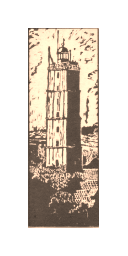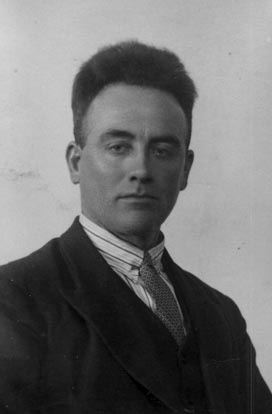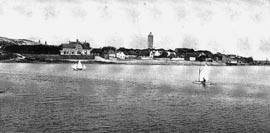
Hinne de Jong
A Chronicle
translated/arranged by his son, Sense de Jong
by Truus Boot (nee de Jong) - his daughter
- 1: Introduction
- 2: Captain Pieter
- 3: Childhood years
- 4: Shipwreck
- 5: Teenager
- 6: Spring remembered
- 7: That's how it was
- 8: Pre World War I
- 9: Mobilization (1914-1918)
- 10: Boys will be boys
- 11: Hinne leaves Terschelling
- 12: Hinne meets his true love
- 13: An eventful move
- 14: A serious illness
- 15: The war years (1940-1945)
- A1: Memories of Pa (by Truus)
- A2: Memories of Moe (by Truus)
- A3: Pa talks again
- A4: Cornelis Jacob de Jong
Another site by Sense de Jong:
~ Sense de Jong ~
Reminiscences
Sites by Henry de Jong:
~ Herman de Jong ~
Memorial
~ Newmaker Notes~
Writings, Pictures, Collections
~ AACS/ICS Niagara Conferences~
1970 - 1991
Sense translated many of the stories Pa (Hinne) wrote. Sadly, these ended after Hennie was born. I would like to tell some of the memories of Pa which stick out in my mind.- Truus
After Jaap and Hennie were born, I spent a lot of time at home. Especially after Jaap’s birth, Moe (Wine) had a hard time taking care of the family. She had a problem with Meniere’s Disease for the last four years, but, amazingly, after the births of Jaap and Hennie things got a lot better.
Jaap was born in the middle of the war. The last two years were a fear-filled time. Every night, always around midnight, English planes would fly over on their way to bomb Germany. Moe must have been very afraid of that while she was pregnant with Jaap. Things didn’t get better after he was born. Even before we could hear the drone of the planes, Jaap had sensed them and would begin to scream. I used to have to take him into the cellar where he wouldn’t hear them. Jaap was a sweet little boy and I took care of him most of the time. I was 14 years older than he was.
Just when we were used to having a baby brother, Moe became pregnant again and I had to stay home from school a second time. This time it was for good. I was 16 when my sister Hennie was born.
A month after Holland’s liberation, life was happy, but still difficult. Things we needed were still very hard to come by, because the Germans had robbed everything of value in our country during their five-year occupation. There was enough food but only the simplest things. Oranges, bananas or chocolate - we hardly remembered what they were. But into this difficult time came Hennie, a cute little thing with curly hair and, like her bigger brother Jaap, a joy to our family. Very early on, she let us know she had a mind of her own. As far as she was concerned, she had five brothers. We always had a good laugh when Pa used to call my Jan, “Jan Boot.” She would stamp her little feet and say, “No! He is Jan de Jong!”
It was a big job to take care of our family: besides me, there were the three big boys and the two “Johnny-come-latelies.” Those little ones made quite a change in our family, both for the parents and us, “big kids.” It is too bad that Jaap and Hennie don’t remember much of the time when we were all at home. It was a wonderful time. We loved those little ones so much and often spoiled them. I think Moe might have been kind of relieved when, one by one, we, older ones, left home. The two youngest were still under the age of 10 when all of us, except Kees and Janny left for Canada. But that is another story.
I think Moe adjusted well to the “mixed” family of grown children and the little ones. She could be stern and strict with us, older ones, and I must confess, we often needed that sternness. Yet, although we always knew she loved us, we were, at times, afraid of her. With the little ones, she was as warm and loving as a first-time mom. It was such a different time. The war was over and she was happy to be feeling so much better than she had been.

What about our dear Pa? Often, he must have wondered, “How am I going to deal with all of this?” He was so gentle with Jaap and Hennie. I can still see him sitting in his chair, holding them, often singing with them. But the years of the war, and the busy family life, working long hours, all took their toll. When Hennie was about three years old, he suffered a nervous break-down. We had known something was not right with Pa for a long time. From already being a quiet man, he grew more and more silent. For days, he would hardly say a word. That was something our extrovert mother couldn’t handle. She called the doctor and he said Pa had to go away for an extended vacation for a long rest. Pa chose to go to his beloved birthplace, Terschelling.
Shortly after Pa left, both Jaap and Hennie came down with the measles. Jaap recovered rather quickly, but Hennie got sicker and sicker. She developed pneumonia and in a matter of a few days became a very sick girl, so sick, in fact, that the doctor told us we had to call Pa home. That afternoon, we called Pa’s sister, Tante Griet, who told us that Pa was taking a walk on the beach. She promised to send someone to locate him. Since it was fall, only the morning ferry would do the run between Terschelling and Harlingen, but there was a speed boat available for emergencies. After a few hours I went to the train station but Pa was nowhere to be seen. After that, I went every hour until the last train had come in. Still no Pa! We had no phone in those days, so it was difficult to get in touch with each other, and so we had no idea what had become of Pa.
I will never forget the night that followed. We were so worried. Hennie’s fever was so high and she was so restless. I kept watch with her the first part of the night. I was just sitting there, looking at her, when all of a sudden, she became very quiet. I couldn’t move. I thought she had died. That moment will be etched in my mind for the rest of my life. I cried out for Moe, but then I saw the blanket move slightly. She was still alive and breathing! Moe and I cried. Then we called the boys. Hennie was sleeping. The crisis was over. At 7 o’clock the next morning the doctor came and examined Hennie. When he was done, he looked up and said, “Thank the Lord! This is a miracle!”
Besides our joy over Hennie’s turn for the better, there was concern about what had happened to Pa. The regular ferry left Terschelling at 7 a.m.. He could be in Winschoten by about 9:30 a.m. I went to the train station, and, finally, there was Pa. In his own quiet way, he greeted me: “So, Truuske, are you here to meet me?” He put his arm around me. I told him that Hennie was getting better and that the crisis was over. Pa looked at me lovingly and, very seriously, told me, “I know that Truus. When I came back from my walk on the beach and Tante Griet told me what was wrong, I was so shocked and very sad. I went upstairs to change my clothes, but first I prayed and pleaded with God to spare Hennie’s life for us. God answered me, ‘Is there anything too wonderful for me?’ Then I knew that Hennie would get better, so it was not necessary to call for a speed boat.” That was our Pa: no doubt, no questions, just solid faith in the knowledge that what God says is true.
Very quietly I asked Pa, “What time did that happen?” He replied, “Around 1 o’clock.” That was exactly the time that Hennie suddenly fell into a restful sleep. Pa gave me a big hug and said, “Never forget, Truuske, that what God says is true!” Pa, being Pa, the quiet introvert, could only tell the story once. He asked me, “Will you tell Moe and the boys? Then we can all thank the Lord.”
Another story that was vintage “Pa” happened when he had to go to the bank. It was a long walk. When he got home, he noticed that the bank had given him 100 guilders too much. Without a second thought, he put his coat back on and headed back to the bank. Instead of appreciating his honesty and effort, the banker replied, “Sir, we don’t make mistakes here.” Pa was so stunned he didn’t know what to say. He came home again with the 100 guilders. Moe’s eyes lit up. “Come on, Truus. Let’s go shopping!” But Pa disagreed. He said, “Wine (that was Moe’s name and is pronounced wee’-nuh), you can’t do that. It isn’t our money.” Moe was perplexed and wondered what they were to do with it then. Just like that, he said, “We are going to put it into the collection on Sunday.” That is exactly what happened.
Events such as these are the beacons in our lives, that God gave us through the faith of our parents. In his quiet way, Pa gave us many such beacons, through his honesty and trust. The only time I ever heard him pray outside the “formula” prayers, was when we left for Canada. He said, “God go with them and take care of them.” That meant more to me than an eloquent speech of a thousand words. We, his children, can hold on to those beacons for the rest of our lives. Thank you, Lord!
I am very happy that I could make many trips to Holland, sometimes alone, but many times together with Jan. We had good times there, visiting Jan’s family and always Pa and Moe.
On our last visit, Pa was not able to talk anymore and was paralyzed from the strokes he had suffered. He just loved it when Moe and I would sing for him and when we left we would pray the Lord’s Prayer with him or recite the Apostles’ Creed. The last time, when we came to the creed’s ending “...tot in der eeuwigheid” (“...and the life everlasting”) he looked at us with tears in his eyes. With great difficulty, he managed to say, “Eeuwigheid.” That was the last word he spoke on this earth. Six weeks later, on August 8, 1982, he went Home to be with his Lord, whom he loved so much and served so faithfully.
When I look back and think about my parents, I see how different they were from each other. Moe was an open book with clear discernable moods. She was openly happy, loving, singing, angry, sad, or stern. We could read her well and we loved her so much.

How different was our Pa. I had to think long for the right words to describe him. When I think of Pa, I think of Terschelling, where he loved it so. We would often walk with him on the beach. Terschelling is a long island and every one of the 28 kilometers along the beach is marked by a pole (Dutch=paal), known as a land post. The first land post, on the west end of the island, is close to the faithful lighthouse, the Brandaris. My life with Pa is like going for that walk from East to West - from pole 28 to pole 1. We would start walking, not saying much, or nothing at all. But it felt good and every time we passed a land post, we knew exactly where we were. Each of those poles were the beacons, the times that Pa made a deep impression on us; when he would show his heart and true feelings - his deep love for us and for the Lord. Then we would walk quietly on, until we passed another land post - another beacon - another memory. After every pole we passed, we could see the light of the Brandaris grow brighter and we walked on, not saying very much. Finally, we reached West-Terschelling, land post number one, under the Brandaris.
As on any beach, there were storms, Pa could get angry or upset. A couple of times there was even quicksand, dangerous and we got out only with difficulty. But then there was another beacon and there was forgiveness and love. And we kept walking - walking to the light. Now Pa is Home, and we are so enriched by those beacons and the memories Pa left us.
The Lord has blessed us with parents, who, each in their own way, have taught us to love the Lord and each other. Thank you Pa and Moe. We love you!!
(Written and contributed by Truus Boot - de Jong)
[an error occurred while processing this directive]